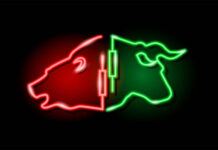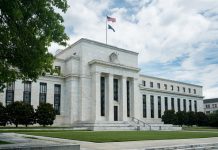Markets
It seemed at first that today was going to be a repeat of yesterday at the start of the European session, be it in less dramatic fashion. Both US and German yields eked out a few more basis points at first. But momentum dwindled after stock markets opened and in no time stacked losses of up to 1.3%. But unlike Monday, core bonds reversed course and began profiting from the risk aversion instead of causing it. Some end-of-quarter repositioning (closing post-Fed bond shorts) could be playing as well. US yields eased between 0.8-3.9 bps with the belly of the curve outperforming the wings. German rates shed 2.2-2.4 bps across the curve. We note that in both cases, yields cut losses in half after the US joined. Today’s main event on the economic calendar is still due after finishing this report with the US Conference Board consumer confidence for September. Several ECB speakers hit the wires but they were of little informative value. Lithuanian governing council member Simkus did repeat the need to discuss (ending) PEPP (reinvestments) “sooner rather than later”.
Dynamics on FX markets were similar to Monday too with a stronger dollar setting the tone initially before paring some gains later on. EUR/USD currently trades virtually unchanged at 1.0591 after having touched an intraday low of 1.057. DXY tentatively forfeits the 106 mark. USD/JPY also gives up earlier, be it minor gains to change hands around 148.89. Japan’s finance minister this morning stepped up verbal warnings, saying they are watching market moves with “high sense of urgency”. EUR/GBP for a third time straight attacked the 0.87 big figure but so far without a sustained break higher. The pair is filling bids in the high 0.86 area currently. Cable loses the 1.22 mark for the first time since March this year. The Hungarian forint in CE stands out against local peers, strengthening to EUR/HUF 388.17. The Hungarian central bank further reduced the O/N deposit tender rate by 100 bps to align it with the 13% base rate. The Monetary Council in this respect concluded the normalisation of the extraordinary interest rate environment. After today’s decision, the central bank’s set of monetary policy instruments will be changed and simplified. Even while implementing a technical simplification, the MNB indicated it is necessary to maintain tight monetary conditions in order to achieve price stability. Taking a cautious approach to changing the base rate is warranted in order to address fundamental inflation risks. With the acceleration of disinflation, the domestic real interest rate will move to positive territory in September and that process is expected gradually continue.
News & Views
According German IFO institute, expectations in the German export industry dropped considerable in September. The Ifo Export Expectations index fell to -11.3 points, down from -6.5 points in August. According to the head of Ifo surveys, Klaus Wholrabe Germany’s export economy is going through a weak phase as Exports to all key regions are currently in decline. At the present time, only manufacturers of leather goods and furniture, as well as a handful of food companies, are said to expect a rise in exports. All other sectors are predicting a drop in international business. The hopes for growth expressed last month in the chemical industry have evaporated. Automakers are now more skeptical as well. Printing companies are currently the most pessimistic. Ifo concludes that that export demand likely won’t pick up significantly until next year.
Inflation in Brazil in September reaccelerated at 0.35% M/M and 5% Y/Y up from 0.28% M/M and 4.24 Y/Y in August. The rebound in inflation was relatively broad-based as 6 out of nine subcategories showed higher monthly prices with transportation prices rising 2.02% M/M. The release of the September inflation data came on the same day the Central Bank of Brazil released the minutes of last week’s policy meeting when the Bank reduced its policy rate by 50 bps to 12.75%. According to the minutes board members saw it appropriate to continue the easing cycle at current gradual pace of 50 bps steps at current meeting. Only substantial positive surprises in the decline of long term inflation expectations or in the services price dynamics would allow for a faster pace of reductions. A survey of the central bank among market participants still saw inflation above the 3.0% target for 2024 and 2025 at respectively 3.86% and 3.5%. The real maintains recent most losses against the dollar with USD/BRL trading 4.97.













